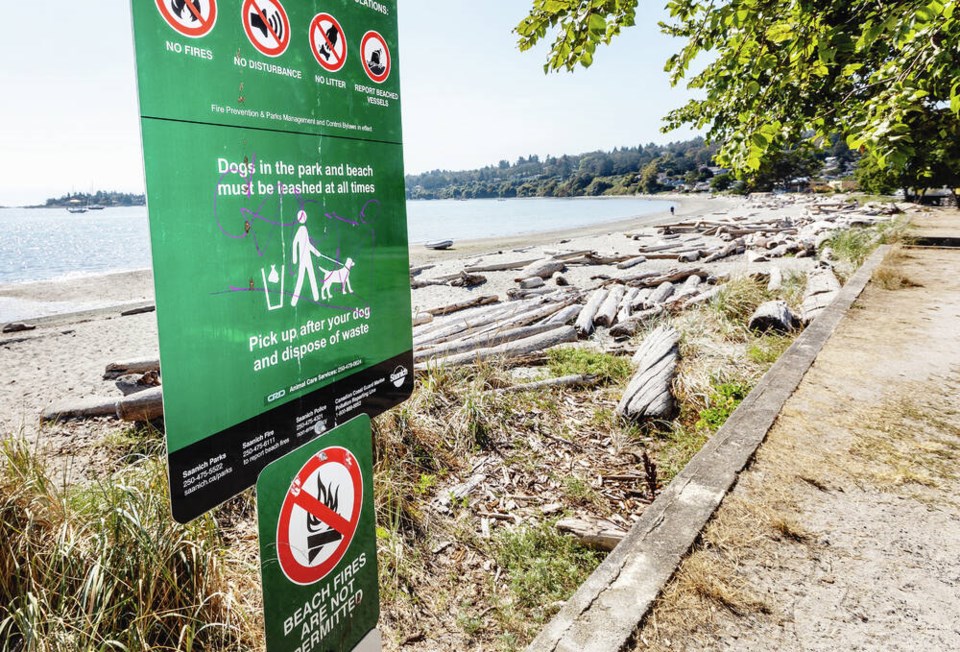A woman whose unleashed dog was seen chasing a great blue heron at Cadboro Bay Beach has been issued two fines totalling $500 for violating leash rules in the Victoria Harbour Migratory Bird Sanctuary.
The woman first received a $100 fine from the Capital Regional District after a bylaw officer witnessed the dog running toward a heron while unleashed on Aug. 25, 2022, because dogs are required to be on-leash in Cadboro-Gyro Park.
The officer then contacted a wildlife officer with Environment and Climate Change sa国际传媒, because the incident happened in the Victoria Harbour Migratory Bird Sanctuary, according to a decision by the Environmental Protection Tribunal of sa国际传媒.
The sanctuary, home to about 270 species of seabirds, waterbirds and shorebirds, covers 30 kilometres of coastline from Portage Inlet to Cadboro Bay and prohibits dogs and cats from running “at large” below the high-tide line.
The coastline is an important roosting and overwintering site for many migratory bird species, including several species at risk, according to Environment sa国际传媒.
The federal agency started cracking down on unleashed dogs in the bird sanctuary in late 2021 after complaints about altercations between dogs and birds in the area. At the time, municipalities scrambled to bring their own bylaws in line with the leash rules of the sanctuary at the request of the federal government, because contradictory rules led to confusion for dog owners.
Victoria removed Gonzales Beach from its list of off-leash areas, and Saanich removed Cadboro-Gyro Park. Oak Bay clarified on its website that dogs should be leashed on Willows Beach and McNeill Bay at all times.
Jacques Sirois, chair of the Friends of Victoria Harbour Migratory Bird Sanctuary, is celebrating the tribunal decision not to overturn the $400 fine, as requested by the dog owner.
“This is important if we want to maintain nature in the city,” he said.
sa国际传媒 has a migratory bird convention with the U.S. that sets out the countries’ conservation plans for migratory birds. The creation of bird sanctuaries is one tool to protect the population from potential harm, the tribunal decision said.
The owner argued her dog didn’t hurt the heron and asked the tribunal to consider that no harm was done.
Tribunal review officer Leslie Belloc-Pinder called the argument an “understandable, but vexing, position” to environmental protection measures that are intended to have the broadest possible application.
“While an individual infraction, considered on its own, can often be characterized as insignificant or benign, the cumulative effect of every infraction is enormous and could lead directly to the environmental harm sa国际传媒 seeks to minimize by implementing various environmental statutes and agreements,” Belloc-Pinder wrote.
Migratory bird sanctuaries require “diligent and constant protection” because violations are likely to be discreet and fleeting, Belloc-Pinder wrote, adding that it’s not legally relevant whether the dog touched or visibly harmed the heron it chased.
Sirois said he’s been told by wildlife officers that they are conducting a few days of enforcement each month. He considers that an improvement over the situation a couple of years ago, when enforcement was essentially non-existent.
But he would like to see more patrols at Willows Beach, Clover Point, Gonzales Beach, McNeill Bay and beaches along Dallas Road.
In recent weeks, there have been several sightings of red knots, a rare, threatened Arctic shorebird, in areas of the sanctuary where there were no dogs at the time, he said.
The bird migrates between the Arctic and South America and refuels on Greater Victoria beaches during the journey, Sirois said.
“These sightings would not happen if there were dogs everywhere.”
>>> To comment on this article, write a letter to the editor: [email protected]



